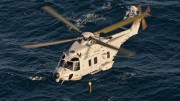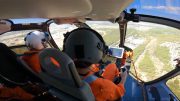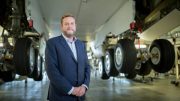New governance = new practices, or is all this purely circumstantial? The fact remains that Tom Enders, CEO of the brand new Airbus Group, which he has headed under the name of EADS since the Board meeting of May 2012, took the decision to present the group’s results for 2013 in Toulouse. Nothing out of the ordinary there, you might say, since the European group, whose headquarters is based in the Netherlands, has decided to set up its operational headquarters in Toulouse, thus abandoning the historic seat of Montmorency in Paris. The first stone of the complex which will house the new headquarters was laid on January 14, the beginnings of the future Airbus campus that will run alongside the Toulouse-Blagnac runways, accommodating 1,500 people in the end.
But the transfer of the Airbus Group headquarters to Toulouse-Blagnac on January 2 at the same time as it changed its name wasn’t the only reason it would seem. And it is definitely not just a coincidence. On the day that the annual conference was held, February 26, and the next day, a Franco-German mini-summit took place in Toulouse with the participation of Claude Bartolone, President of the French National Assembly and his German counterpart (president of the Bundestag) Norbert Lammert. Not only were they to visit the Airbus plant, and in particular the A380 and the A400M, but on the evening of the 26, a dinner was organised in the presence of the German CEO of Airbus Group, Tom Enders.
Not much chance that the Eurofighter would be on the menu, however, since Germany had announced cancellation of an order for 34 of the Tranche 3B of the Typhoon. Involved in wrangling with the German government over a possible claim for compensation for this cancellation (to the tune of 900 million euros), Tom Enders pointed to the difficulties of managing a multinational aircraft programme (Eurofighter is developed by Germany through Airbus Group, by the United Kingdom through BAE Systems and by Italy with Finmeccanica), because it is impossible to make any profit when the number of deliveries is unclear. This observation however led him to admit that in terms of defence, “Airbus Group must become more competitive”. And to do so, he said, in substance “We must strengthen our organisation, and reduce our costs to face fiercer and fiercer competition, which is also true of the space sector“. Especially, he added, since “the products
we have sold in the past are not necessarily suitable for export, they are perhaps too complex… ». To
boost the combined defence and space sector, the idea is to implement a plan similar to Power 8/Power 8+ (termed a model of reorganisation by Harald Wilhelm, CFO of the group) which proved its worth for commercial aircraft. “With this restructuring, we can achieve a profitability of 10%”. In 2013, this operating profitability was of 6% at Astrium and 7% for Cassidian, while at Airbus Military, although not limited to the A400M, it is this model which enabled a peak of profitability to be reached with the delivery of the first aircraft at the end of the financial year.
The reorganisation of the group into three divisions (Airbus for commercial aircraft, Airbus Defence and Space, that integrates Airbus Military including the A400M, and Airbus Helicopters) combined with its new governance, now well in place, is aimed at achieving a rate of return of 10% for the group as a whole. However, for the 2014 fiscal year, Airbus Group prefers to be cautious and forecasts a moderate operational profitability.
It does however confirm that it is aiming for an operating margin of 7 to 8% in 2015 “because the EBIT and earnings per share performance (€0.75 per share will be distributed for 2013 on June 2) will depend on the ability of the group to limit non-recurring expenses, including future one-time items related to the A350XWB programme and exchange rate effects.
Nicole B. for AeroMorning















Be the first to comment on "Airbus Group revamping its defence and space operations to take on markets"